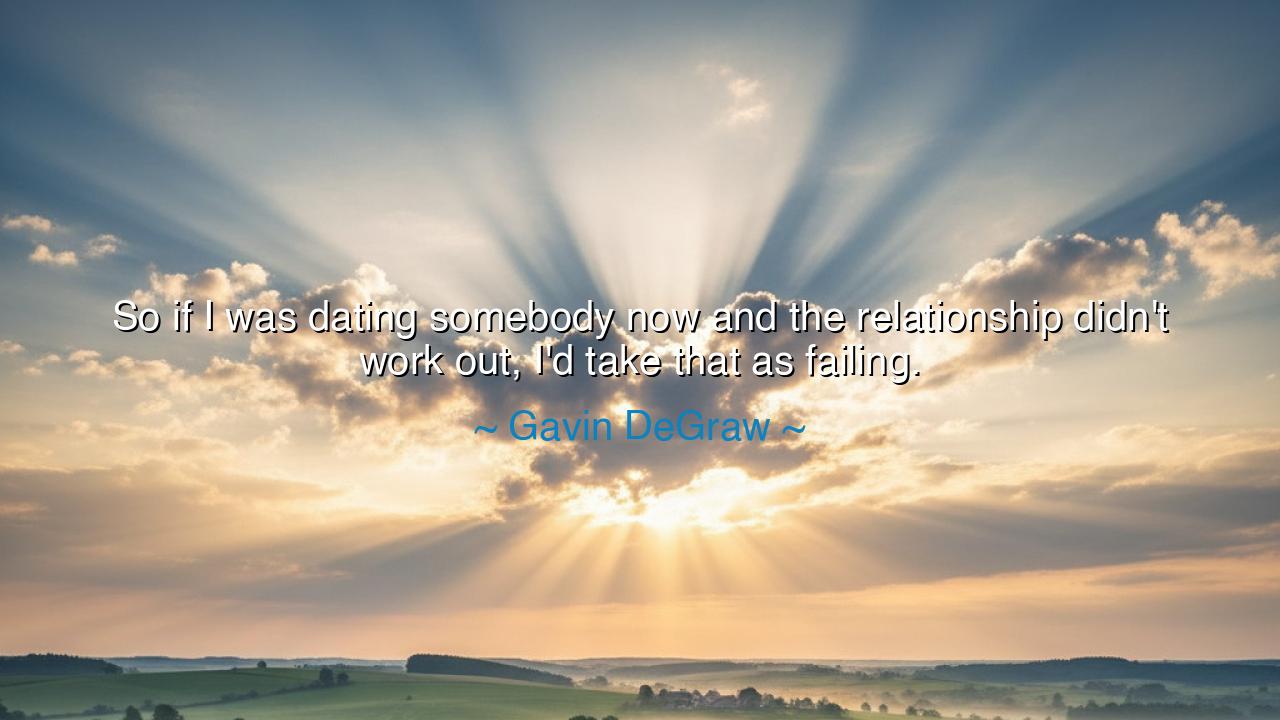
So if I was dating somebody now and the relationship didn't work
So if I was dating somebody now and the relationship didn't work out, I'd take that as failing.






In the earnest and vulnerable words of Gavin DeGraw, the musician whose songs have long been woven from truth and tenderness, we hear a confession that carries both courage and sorrow: “So if I was dating somebody now and the relationship didn't work out, I'd take that as failing.” At first, this may seem like the simple ache of a man who values love too deeply—but listen closer, and you will hear something far older, far wiser: the echo of the ancient belief that to love is to make a vow, and that the breaking of that vow wounds not only the heart, but the soul’s integrity. DeGraw’s words are not about romance alone—they speak of the sacred seriousness of commitment, of the weight of human connection in an age that treats it lightly.
He speaks as one who has lived long enough to understand that love is not a pastime, but a covenant. To say that a failed relationship would feel like failure is to reveal a heart that honors love as sacred work—a work requiring patience, endurance, and humility. In a world that celebrates detachment, DeGraw’s sentiment is rare. It recalls the wisdom of the ancients, who saw love not as fleeting passion but as a mirror of the divine order. For the Greeks, Eros was not merely desire—it was the creative force that bound the universe together. To fail in love, then, was not just to lose affection; it was to fall out of harmony with life itself.
Yet his words also carry the sting of human imperfection. For who among us has not loved with sincerity, only to see the bond unravel? DeGraw’s notion of “failure” is not one of pride or vanity—it is born of longing, of the wish that one’s love might stand as a lasting monument to truth. There is honor in that wish, but also danger: to equate loss with failure is to forget that love, like all living things, must sometimes die to teach us its full meaning. Even the most noble of hearts must learn the art of letting go. Thus, the ancients taught that the gods themselves knew heartbreak. Orpheus, who journeyed into the underworld to reclaim his beloved Eurydice, failed to bring her back—and yet his failure gave the world music that would echo through eternity.
To take heartbreak as failure is a wound of the idealist. It speaks of a soul that cannot love halfway, one that gives all or nothing. In this, DeGraw joins the company of those who see love as an act of devotion, not convenience. Like Hector, who fought not for victory but for honor, such a soul measures worth not in outcomes but in the integrity of effort. To love and fail, for such a heart, is still a form of defeat—but it is a noble defeat, one that refines the spirit and proves that the person has lived fully. For only those who risk failure can ever touch greatness.
There is a story told of the samurai, who believed that a warrior’s worth was not measured by whether he survived the battle, but by whether he entered it without fear. The same is true of love. To love bravely, even knowing that it may not last, is to live as the warrior of the heart. Gavin DeGraw’s words reveal that he is such a warrior—one who loves not for convenience, but for conviction. To him, a broken bond would not simply be an ending, but a loss of purpose, a breach in the sacred trust between two souls. Yet within that pain lies wisdom: the understanding that the heart, once broken, must still keep its vow to life—to love again, not less, but better.
The deeper meaning of DeGraw’s reflection, then, is not to avoid failure, but to respect love enough to mourn its loss. For love is a mirror of one’s character; how one loves reveals who one is. If love fails, it does not mean the heart was unworthy—it means the heart dared to try. The ancients believed that every act of sincere love, even if it ends in sorrow, nourishes the soul and ripens it for eternity. So too does every heartbreak refine us, teaching patience, humility, and the sacred art of beginning again.
Therefore, let this be your lesson, children of time: do not fear failure in love, but fear indifference. Do not treat affection as entertainment, or intimacy as conquest. Love with seriousness. Love with reverence. And if your love should falter, let it not diminish you. Gather the ashes, learn from them, and walk onward with grace. For in the eyes of eternity, failure in love is not defeat—it is proof that your heart was brave enough to seek the divine in another, and that, even in loss, you honored what is most holy in the human soul.






AAdministratorAdministrator
Welcome, honored guests. Please leave a comment, we will respond soon